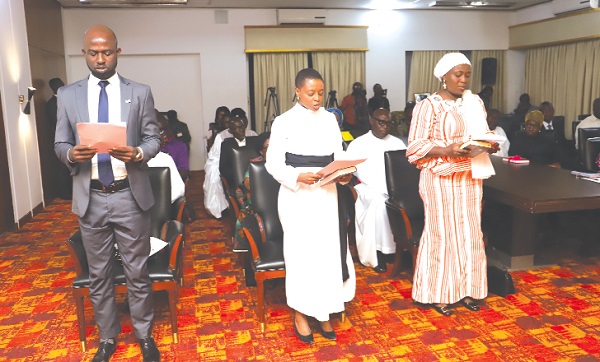
Recent appointments to EC: Building resilience or digging our grave?
It is often said that there is no smoke without fire, although technology and miracles have rendered this assertion partly untrue.
In a similar vein, perceptions are not necessarily facts, and facts may not necessarily constitute the truth; yet, life without these is inevitable.
The reality, however, is that perception has an impact on truth; hence, to ignore perception because it may not be the truth is like drinking a scientifically proven deadly substance based on the biblical claim that if you drink any deadly thing, it shall not hurt you.
This explains why the brouhaha surrounding the recent appointments to the Electoral Commission (EC) will continue to run as a developing story.
Interests
Interestingly, no one has publicly raised qualms against one of the appointees , Rev Akua Ofori Boateng. The other two, Dr Peter Appiahene and Hajia Salima Ahmed Tijani, have been criticised by a section of Ghanaians, including the Coalition of Domestic Election Observers (CODEO), the Centre for Democratic Development-CDD-Ghana, the main opposition party – the National Democratic Congress (NDC) and other civil society organisations (CSOs), for being politically tainted in partisan ink. While some have called for the resignation of the two, others have advised that the President revokes the appointments.
The New Patriotic Party (NPP) has defended the two accused appointees of being associated with the party, at least on two grounds. First, it is argued that the party has no record of them as members. Second, and murkier is the claim that everyone votes; hence, everyone is aligned in one way or another to a political party so their competence to do the job should not be subordinated to their perceived partisan inclination.
The defence from the NPP in part may minimally be in sync with standard reference in some advanced democracies such as the United States where one’s ideological leaning may be immaterial when it comes to appointments to the Supreme Court. But that is the Supreme Court in the US where institutions are not under the whims and caprices of the ruling government. Yes, we must aspire to grow, but the truth remains that the average Ghanaian operating under our weak institutional regime, the powerful executive arm of government, and in an atmosphere of mistrust, can hardly be trusted to stay neutral when it gets tough, particularly on the subject of power.
It is in this context one will share the position that people appointed to our EC should not have known association with a political party, especially on activism.
Reputation
The EC is the ultimate institution that must be credited for the consolidation of Ghana’s democracy on the minimal basis of election turnover.
The EC’s enviable reputation has since the 2013 disputed election petition suffered a diminishing return, and the removal from office of some commissioners and subsequent appointments cannot be delinked from this.
While the intentions may have been good and meant to further strengthen the EC, the outturn, unfortunately, like Soviet leader Gorbachev’s reforms-glasnost and perestroika- has been the opposite.
We must be worried as a people that at the time democracies are suffering a decline worldwide, public confidence in Ghana’s EC has dropped to 10 per cent in a recent Aforobarometre Report. In a country where opposition parties, hardly lose elections but always claim they were cheated, the least we can do is to appoint real or perceived partisan-tainted individuals to the EC. This, coupled with the fragile global economic conditions, as noted by the World Bank, can have an adverse effect on escalating geopolitical tensions, and for us, in Ghana, fertile grounds for any trickle-down effect could easily be through elections, although officials of the EC might have genuinely been neutral arbiters. This is why we must be careful when appointing people to the EC.
If politically exposed individuals are appointed to the Electoral Commission of Ghana, there is the real risk that their decisions could be influenced by their political affiliations, particularly with the recent trend where political parties even dictate to MPs what to do. This could lead to real or perceived biased outcomes. Additionally, such appointees could be vulnerable to external influence from political factions, leading to corruption and fraud. The ultimate danger is that it will further lower public trust in the EC.
Way forward
In view of the cocktail of partisan accusations levelled against the two appointees, the way forward is either to recuse themselves from making decisions that may conflict with their personal or political interests or simply resign. In case the former applies, they should limit their involvement in activities that could be seen as a conflict of interest and stay impartial and unbiased when carrying out their duties.
Department of Political Science Education, University of Education, Winneba.
